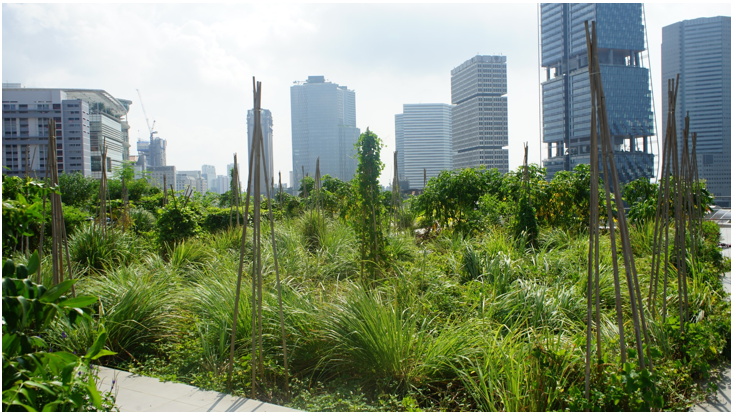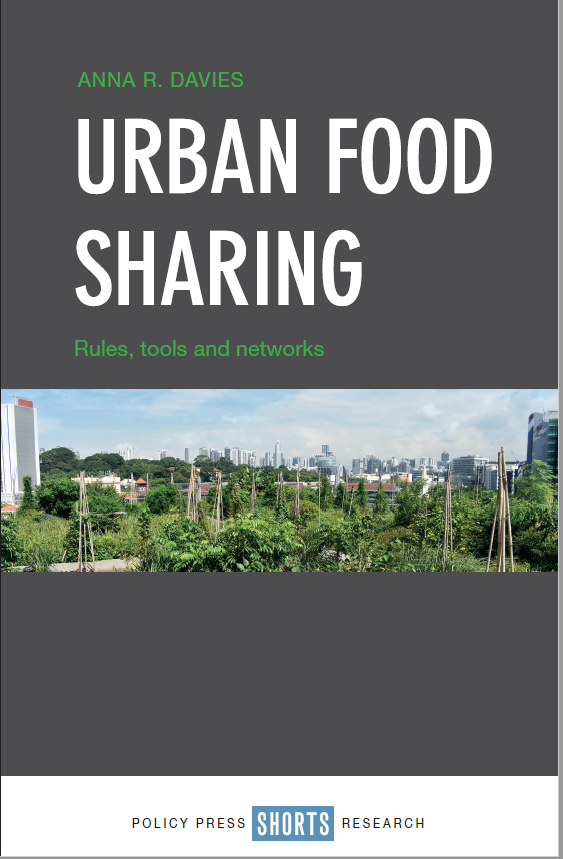Urban Food Sharing: Rules, tools and networks
Published by SHARECITY on the 30th May 2019.

We are delighted to announce the launch of Urban Food Sharing: rules, tool & networks by SHARECITY’s PI Anna Davies!
When was the last time that you ate together with others? Maybe you had breakfast with your family or lunch with your friends. Such food sharing is often part of everyday routines; habitual practices that we rarely reflect on, except when they change.
Urban Food Sharing: Rules, tools and networks by Anna Davies (available for free to download here) explores the history and current practice of food sharing. Food sharing is a foundational human practice at the very core of human civilisation, helping to secure sustenance, cement social relations and permit role specialisation within societal groups. Illustrated by rich case studies from around the world, the book uses new empirical data to set an agenda for research and action.
The conceptual and empirical foundations for Urban Food Sharing are located within our large-scale, multi-year research project of ICT mediated urban food sharing that began in 2016. The SHARECITY research resulted in the first international mapping experiment of ICT-mediated urban food-sharing initiatives across 100 urban areas, spanning 43 countries and six continents. The SHARECITY100 database was made interactive and placed online, available to anyone to use and key findings of this phase of research are detailed in Chapter Two of the book.
The remainder of the book combines insights from the database with those from a suite of ethnographies conducted in London, Berlin, New York, San Francisco, Dublin, Athens, Barcelona, Melbourne and Singapore. In each urban area interviews were conducted with those who were pivotal in setting up the sharing initiatives and those who are charged with regulating them. Alongside these formal interviews were a suite of engagements with those who shared as they grew, cooked, ate or redistributed food, and it is this research that forms the basis for the remainder of the book: the social, political and legal rules that both shape food sharing and are reshaped by its practices (Chapter Three); the particularities of socio-technical configuration that mediating urban food sharing with ICT creates (Chapter Four); and the connections and interconnections that result from the emergence of ICT-mediated urban food sharing (Chapter Five). The final chapter establishes a set of trends that can be distilled from the research and presents a framework for future research.
While for many citizens, particularly those in western, urban contexts, the extent of sharing around food – including growing, cooking or eating together – may have declined, this book is testament to the fact that food sharing beyond friends and family still persists, and its practice is evolving and adjusting to new contexts. As a result, the scope of this book is set by a suite of fundamental questions about contemporary urban food sharing: what is it, why does it occur and how is it performed? Responding to these questions involves identifying and interrogating the rules, tools, skills and understandings that shape food sharing, from legal frameworks to habitual practices, conventions and routines. The book fills a sectoral gap in explorations of contemporary urban sharing and explicates for the first time the rise of ICT-mediated food sharing.
Urban Food Sharing: Rules, tools and networks will be an important resource for researchers, policy makers and sharing innovators to explore the impacts and sustainability potential of such sharing for cities.
Urban Food Sharing: Rules, tools and networks by Anna Davies is available Open Access under CC-BY-NC licence on OAPEN.
“A promising and original contribution to studies on the socio-technical processes that underpin urban food system transitions to sustainability….innovative and timely.” Rositsa T. Ilieva, Urban Food Policy Institute, City University of New York
“This smart book helps us to recognize how destructive the commodification of food has been and the social isolation it has fostered given that all human life requires food to survive.” Nik Heynen, University of Georgia
To find out more about communal dining and food sharing initiatives, please check out our latest blog post on Policy Press here
© 2015 - 2024 ShareCity | Web Design Agency Webbiz.ie








